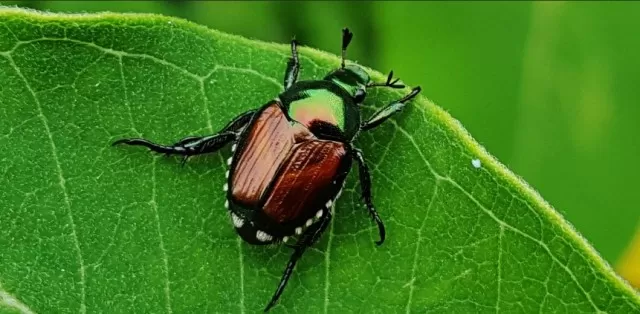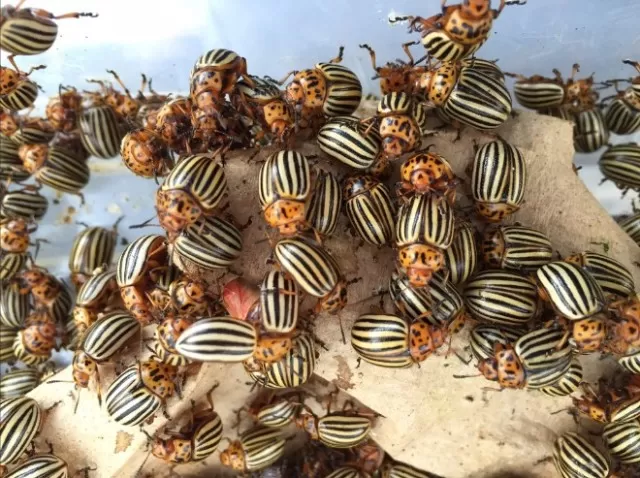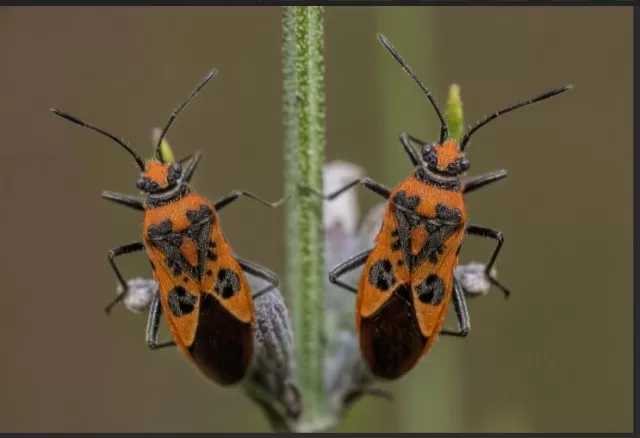Spring’s Primary Garden Pests to Watch Out For. As spring breathes new life into your garden and the promise of blooming roses fills the air, you might notice a rather unwelcome sight: small, telltale holes in your rose leaves. Don’t worry; you’re not alone in this garden woe. Those holes are often a sign that certain pests are indulging in your roses. Let’s take a closer look at what might be causing these holes and how to address the issue.
Gorgeous but Destructive: Managing Japanese Beetles in Your Garden

Japanese beetles, with their mesmerizing iridescent and jewel-toned appearance, may captivate the eye, but their presence can quickly turn your garden into a battleground.
These voracious pests have a knack for devouring blossoms and leaves seemingly overnight, leaving behind a trail of destruction.
To protect your garden from the ravages of Japanese beetles, it’s crucial to act swiftly at the first sign of an attack.
Consider using a neem oil-based insecticide, a solution known for its effectiveness against these pests. Importantly, neem oil is relatively benign to birds, mammals, and your precious plants, making it an eco-friendly choice to safeguard your garden’s beauty and vitality.
Aphids: The Tiny, Tenacious Garden Pests
Aphids, those minuscule yet troublesome sap-sucking insects, have an insatiable appetite that spans all parts of a plant, from its roots and stems to its petals and leaves.
What makes them even more challenging is their rapid reproduction rate, allowing an aphid infestation to swiftly take hold and spread throughout your garden.
To combat these persistent pests and protect your plants, consider planting flowers known for their aphid-resistant properties, such as marigolds and lavender.
These resilient blooms can help discourage aphids and promote a healthier garden environment, reducing the need for chemical interventions and fostering a more natural balance in your outdoor space.
Colorado Potato Beetles: Pests That Extend Beyond Colorado

Despite their regional name, the Colorado potato beetle is a formidable pest that can wreak havoc on gardens and crops across North America, not limited to the Rocky Mountains.
These distinctive yellow-orange beetles, measuring approximately 3/8 inch in length, possess an insatiable appetite and are known to target a variety of plants, including tomatoes, peppers, eggplants, and, as their name implies, potatoes.
Gardeners and farmers across the continent often find themselves grappling with these persistent pests.
To help thwart an infestation and safeguard your valuable crops, consider using neem oil, a natural and eco-friendly solution that can deter Colorado potato beetles while being relatively harmless to birds, mammals, and your plants.
Guarding Against Cutworms: Protecting Your Plants
Cutworms, the larval stage of Noctuidae moths, are notorious for their voracious appetite.
They earned the name “cutworm” because of their tendency to chew through plant stems below the soil, often felling young plants just as they begin to thrive.
To shield your plants from the destructive habits of cutworms, consider encircling the stems with diatomaceous earth.
This natural substance, composed of the fossilized remains of diatoms, contains sharp, abrasive particles that can deter these hungry caterpillars. By creating a barrier around your plants, you can help safeguard them from the damage inflicted by cutworms and ensure a healthier garden.
Squash Bugs and Squash Vine Borers: Guardians of Your Garden\’s Bounty

Zucchini and other squash varieties are beloved by gardeners for their rapid growth and abundant harvests.
However, these prolific plants can fall prey to two formidable foes: squash bugs and squash vine borers, both of which pose a threat to the entire plant.
To protect your precious squash crops, vigilance is key.
Keep a close eye on your plants for signs of trouble, such as yellowing and wilting leaves, as early detection is crucial in thwarting these pests. By promptly identifying and addressing any issues, you can help ensure a bountiful and healthy harvest from your squash plants.
*The information is for reference only.